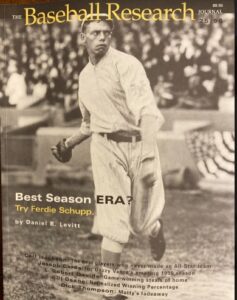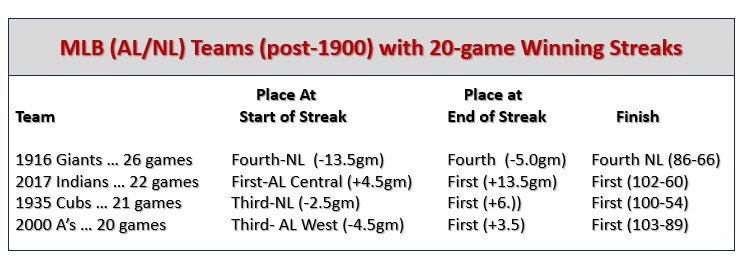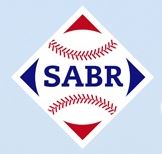In today’s post, Baseball Roundtable takes a look at (possibly) the streakiest team in MLB history. As is the Baseball Roundtable tradition, when I look into baseball events (past and current) “one thing always leads to another.” This journey began with my interest in the remarkable 1916 season of New York Giants’ pitcher Ferdie Schupp (more on that in a bit.) However, I soon became distracted by the remarkably streaky season of the 1916 Giants as a whole.
On this date (September 7) in 1916, the aforementioned Schupp started for the Giants against Nap Rucker and the Brooklyn Robins (Dodgers) at the Polo Grounds. Southpaw Schupp went the distance for the Giants, tossing a two-hitter. Lefty Rucker also went the distance (a six-hitter) and all four runs scored against him were unearned. The win brought the fourth-place Giants record to 60-62 and dropped the second-place Robins to 74-51.
More important, the win was the first of an MLB-record 26-game winning streak for the Giants. (Side note: the streak was interrupted after 12 games by a 1-1 tie. However, ties were not counted in MLB standings and, at the time, games were replayed not resumed. Therefore, MLB recognizes the Giants’ streak as the record.)
That the Giants would go on a streak is no surprise. During the 1916 season, looking at streaks of five or more games, the Giants:
- Had winning streaks of 26 and 17 games;
- Suffered losing streaks of eight games (part of 13 losses in 15 games), five games and six games (the latter two part of a streak of 11 losses in 12 games).
The 1916 Giants are the only team with a 20 (or more)-game, in-season winning streak that did not finish in first place. In fact, the Giants started their record winning streak in fourth place, ended the streak in fourth place and finished the season in fourth place.
The Giants’ two winning streaks provided a record-book bonanza.
- The 26-game winning streak (September 7 through September 30) involved all home games (part of a 31-game homestand). That gave the Giants the record for the overall MLB winning streak and home winning streak.
- The 17-game winning streak involved all road games (part of a 21-game road trip). That streak gave the Giants the record for consecutive road wins. While the Tigers broke the overall record for consecutive road wins in 1983-84, the Giants still share the single-season record of 17 consecutive road wins (with the 1984 Tigers).
A Tiger by the Tail
The 1983 Tigers won their final four road games. Detroit then opened the 1984 season by winning their first 17 road games (on their way to a 35-5 start). The 17 road wins tied the single-season record for consecutive road wins and (with the four final road wins of 1983) helped set a new multi-season mark for consecutive road wins.
Now, let’s get back to those 1916 Giants. In their 26-game winning streak, they outscored their opponents 121-32 (not counting the 1-1 tie). The streak included ten shutouts and four one-run victories.
 During the streak, southpaw, Ferdie Schupp, the original topic of the research behind this post, started six games and went 6-0, with a 0.33 earned run average. He tossed six compete games and gave up just three runs (two earned) and just 17 hits in 54 innings.
During the streak, southpaw, Ferdie Schupp, the original topic of the research behind this post, started six games and went 6-0, with a 0.33 earned run average. He tossed six compete games and gave up just three runs (two earned) and just 17 hits in 54 innings.
Schupp (who made his first 1916 MLB appearance on June 13) finished the 1916 season with a 9-3, record and a 0.90 earned run average in 140 1/3 innings. Notably, Schupp’s 0.90 earned run average was – at the time – recognized as the MLB single-season earned run average record. If you look at today’s record books, the single-season lowest ERA record (post-1900) is assigned to the Red Sox’ Dutch Leonard (0.96 in 1914), with statisticians applying the current qualifying standard of at least one inning pitched per team’s game played. But as Daniel Levitt pointed out in his superb article in the 1996 Society of American Baseball Research “Baseball Research Journal (“Lowest Season ERA? Ferdie Schupp. He meets the Criteria”), the standard for qualifying at the time was a season of with at least ten complete games. Levitt makes a strong case that Schupp should still have the record on the basis of the criteria at the time, longevity of that recognition and the lack of new evidence to the contrary. Baseball Roundtable agrees (that was the original focus of this post).
Schupp followed up his 1916 season with a 21-7, 1.95 record for the 1917 Giants (with 25 complete games in 32 starts). His career MLB mark (10 seasons) was 61-39, 3.32.
Here are a few other factoids about 20+ game MLB winning streaks:
- In their 2017 22-game wining streak, the Cleveland Indians outscored their opponents 142-37, threw seven shutouts and won four one-run games. The streak covered 11 home games and 11 away games. The Indians’ big four starters of Trevor Bauer, Mike Clevenger, Carlos Carrasco and Corey Kluber picked up wins in 17 of the 22 games (they also got the wins in 65 of the team’s 102 2017 victories).
- The 1935 Cubs outscored their opponents 137-50 in their 1935 21-game winning streak. It included four shutouts and five one-run games – and 18 home games (versus three road games). Eighteen of the Cubs’ 21 wins involved complete games by the Cubs’ starting pitcher (#HowTheGameHasChanged).
- The 2002 A’s outscored their opponents 141-65 in their 20-game winning streak, which included four shutouts, four one-run games, ten home wins and ten road wins. The final three wins in the A’s streak were walk-off wins at home.
Primary Resources: Baseball-Reference.com; Baseball-Almanac.com; “Best Season ERA? Try Freddie Schupp,” by Daniel R. Levitt, The Baseball Research Journal, Society for American Baseball Research, 1996.
Baseball Roundtable – Blogging Baseball Since 2012.

 Baseball Roundtable is on the Feedspot list of the Top 100 Baseball Blogs. To see the full list, click here.
Baseball Roundtable is on the Feedspot list of the Top 100 Baseball Blogs. To see the full list, click here.
Baseball Roundtable is also on the Anytime Baseball Supply Top 66 Baseball Sites list. For the full list, click here.
I tweet (on X) baseball @DavidBaseballRT
Follow/Like Baseball Roundtable’s Facebook Page here. Find More baseball commentary; blog post notifications; PRIZES.
Member: Society for American Baseball Research (SABR); Negro Leagues Baseball Museum; The Baseball Reliquary.
P1002






